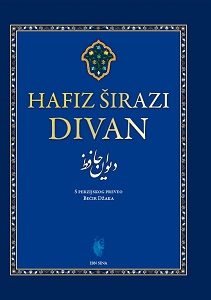

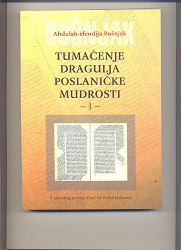
Keywords: Fusus al-hikam; Muhyiddin ibn ‘Arabi; Abdullah-efendija, Bošnjak;
Djelo Fusus al-hikam ili Dragulji poslaničke mudrosti muslimanskog sufijskog filozofa, teozofa i krajnje njegovanog sufijskog hijeratika Muhyiddina ibn ‘Arabija, porijeklom iz nekadašnjeg muslimanskog Andalusa, neprežaljenog i neponovljivog muslimanskog kraljevstva na jugu Europe, ne predstavlja samo neiscrpivi sadržinski locus za krunske teme sufijske književnosti i ezoterijske tradicije islama, uopće, nego simbolizira najraskošniju i do danas u potpunosti neapsolviranu metafiziku imaginacije utemeljenu na spoznaji i neposrednom duhovnom iskustvu mubashare ili imaginalne vizije popraćene glasom iz svijeta malakuta, svijeta žive stvaralačke imaginacije ili iz mundusa imaginalisa (‘alam al-amthal).
More...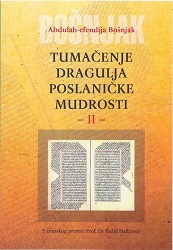
Keywords: Fusus al-hikam; Ibn ‘Arabi;
Prije gotovo trinaest godina objavili smo naš prvi prijevod Ibn ‘Arabijevih ‘Dragulja poslaničke mudrosti’ (Fusūs Al-Hikam) koji bismo, sada, mogli označiti svojevrsnim interpretativnim prijevodom sa arapskog izvornika. Taj prijevod nije bio takav samo zato što je bio uvjetovan konkretnom akademskom zadaćom moga mentora profesora Vladimira Premeca koji je u ono vrijeme tražio da naporedo sa pisanjem doktorata prevedem i temeljno djelo autora čije mišljenje je bilo predmetom moje doktorske disertacije, već i stoga što je Ibn ‘Arabi sadržaj ovog svog djela djelimice ispisivao na pergameni, a djelimice zamišljao u vlastitom umu, tako da je moj tadašnji, prvi prijevod nužno pratio tumačenja njegovih najslavnijih učenika i komentatora u dijelovima sadržaja koje je nosio u umu, a nije ih izložio svjetlosti dana.
More...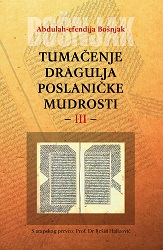
Keywords: Fusus Al-Hikam; Ibn ‘Arabi;
Pred našom kulturnom javnosti je, napokon, i treći, pretposljednji svezak velikog ‘Komentara’ Abdulah-efendije Boš- njaka na temeljno djelo sufijske literature Fusus Al-Hikam (Dragulji poslaničke mudrosti) sjajnog Andalužanina, europskog muslimana iz dvanaestog stoljeća, šejha Ibn ‘Arabija. Ovaj svezak sadrži osam cjelina ili osam logosa kao osam poslaničkih paradigmi kroz koje šejh Ibn ‘Arabi u svome zgusnutom tekstu razmatra različite dimenzije i najupečatljivije naglaske Božije Objave koja se otkriva kroz cijelu svetu povijest, kroz intime različitih poslaničkih likova i unutar različitih svetogeografskih toposa i svetojezičkih odora. Abdulah-efendija Bošnjak svojim tumačenjem ustopice prati Ibn ‘Arabijev tekst i razuđuje ga u blistavi interpretativni univerzum ideja koji se danas smješta u sami vrh najbriljantnijih komentara ikad izrečenih na temeljni sadržaj ovog Ibn ‘Arabijeva teksta.
More...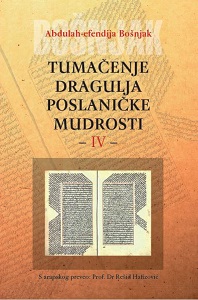
Keywords: Fusus Al-Hikam; Ibn ‘Arabi;
Tumači Ibn ‘Arabijeva djela Fusus Al-Hikam su ustanovili sadržinsku povezanost između mudrosti izražene u ‘Isaovom (a.s.) logosu i one koja je izložena u Sulejmanovom (a.s.) logosu. Ona prva je uzlazeća, uzvisujuća ili uzvišena mudrost, a ova potonja je ‘spuštajuća’, silazeća mudrost. U onoj prvoj oni, također, nastoje prepoznavati naročitu ‘poslaničku’ ulogu, dok u ovoj potonjoj raspoznaju ulogu ili značenje ‘hilafetske’ vlasti ovaploćene u liku poslanika Sulejmana (a.s.). Još jedna zajednička nit postoji između ove dvije mudrosti, a ona se ogleda u činjenici da su obje iziskane ili su rezultat molitvenog zaziva koji je, u ime ‘Isaa (a.s.), učinila njegova majka, hazreti Merjema koja se, čak, u molitvi svojoj zavjetovala Bogu da će Njemu, i samo Njemu posvetiti ono što je u utrobi njenoj, dok je onaj molitveni zaziv u slučaju ove potonje mudrosti ozbiljio sam Sulejman (a.s.), iščući od Boga poseban dar kraljevstva/nebeske baštine kakvu Bog nikome prije njega nije dao, a poslije njega samo Poslaniku islama (a.s.), ali ovaj takvu vrstu baštine nije htio javno objelodaniti zbog Sulejmanove (a.s.) molbe da takva baština ne bude darovana nikome poslije njega.
More...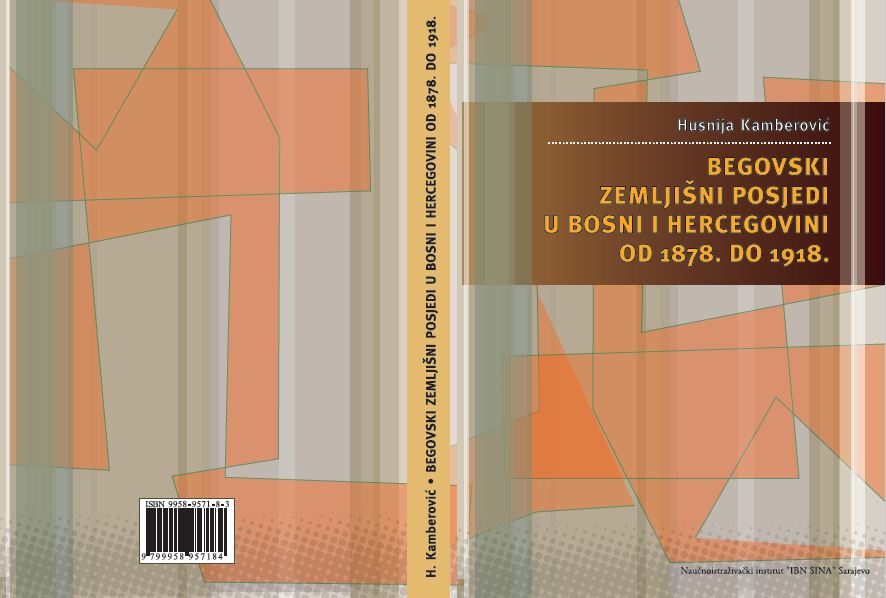
Keywords: bey families in Bosnia and Herzegovina; Land owned by Beys;
It is not at all easy to define what should be considered as beys in the era, when in the Bosnia and Herzegovina at the turn of 19th to 20th century, the whole society was confronted with major changes caused by the establishment of a new state and political structure within which all the social structures that had existed until then had to undergo a radical transformation process. When, in the beginning of 20th century, a team of expert was engaged tasked with defining the title of bey in relation to Austro-Hungarian aristocracy, as well as to determine the manner of proving the right to hold that title and finally to decide which families are to be considered as the bey families, soon it was discovered that even the experts could not reach any agreement. That is why the Austro-Hungarian administration tacitly recognized the right of those families who used that title to continue using it, but this very fact did not acknowledge them any other political or social rights. Some political privileges that belonged to the richest families reflected, e.g., in their legal right to be elected deputies in the Bosnian Assembly, were not the consequence of their bey’s title but rather of their wealth. It is of no relevance that these were all more or less the bey families. Therefore it is absolutely justified to conclude that in the time of Austro-Hungarian administration, big landowners were beys, although within this landowners’ elite there were families that did not belong to the rank of beys. In these circles there was a clear distinction between the landowners who were beys and those who were not. Besides, there were bey families that in the Austro-Hungarian time did not belong to the landowners’ elite. These bey families have not been the subject of analysis in this book that focuses on the land owned by beys. The analysis of social status of these bey families will be the subject of some future book. Focusing on the land owned by big landowning bey families, this book particularly analyzes the structure of the estates owned by 46 bey families. One can see in this analysis that most of the land in BiH belonged to these families. About 15% of all the free land estates (beyluks)and above 30% of serfs’ settlements belonged to these families. Total number of serf settlements in 1918 that were owned by these 46 families, and fro whom one can establish with certainty names and surnames of the leaders of serf families, and the locality of the settlement, amounted to 31,986, but it is only for 5761 of those settlement that we can establish size and detailed structure, while for the remaining 26,225 we only know the name and surname of the serf and the locality of the settlement. This is still enough information for the analysis conducted in this book. Within this circle there are distinctly those bey families who have maintained, even towards the end of Austro-Hungarian administration, and despite a constant process of division of the families and their property, the status of landowning elite so that some of them owned over 50 serf settlements which was considered sufficient for one’s existence without the need to engage in additional jobs (handicraft, trade, etc.)It is evident that these are, mainly, those families who played significant role in the history of Bosnia since the beginning of 18th century, and one could track down their ownership over many of their estates for several centuries back. Following the history of these families during the 19th century one can conclude that marriage relations were very important for the expansion of their estates, since the inheritance of the estates involved both male and female family members, resulted in intermingling of ownership relations among the members of these families. Cases of purchasing land were rare.
More...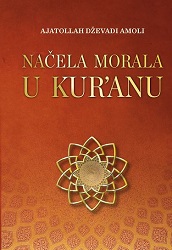
Keywords: morality; ethics; Qur’an;
Između svjetonazora i etike postoje međusobni utjecaji i sprege. Naime, s jedne strane, etika (znanost o moralu), poput logike, prirodoslovlja i matematike, spada u partikularne znanosti i pod okriljem je “opće znanosti” – svjetonazora, jer ta znanost dokazuje svoj predmet (a to su duša i njene moći),3 kao što dio njih (tj. neke moći duše) dokazuju i prirodne nauke, a s druge strane, etika, također, donosi sudove i o svjetonazoru u smislu da se u etici dokazuje da je monoteistički svjetonazor dobar budući da je okrenut ka duhu, pohvalnim djelima i savršenstvu duše, a ateistički svjetonazor loš, štetan i nosi negativne posljedice po dušu.
More...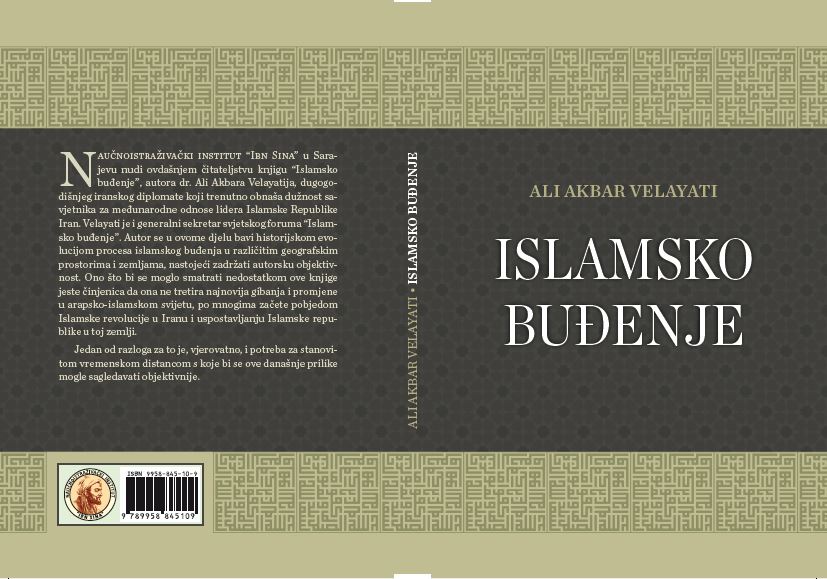
Keywords: Politics; Islam;
Za izučavanje ideja savremene arapske političke misli kori- štena su tri metode. Prva od njih jesu radovi koji se metodološki zasnivaju na proučavanju različitih struja i tokova političke misli, gdje, recimo, spadaju djelo Hamida Enayata Tokovi arapskog političkog mišljenja (Sayr-e andiše-ye sisayi-ye ‘Arab) te knjiga Medžida Haddurija Političke struje u arapskom svijetu (Gerayešha-ye siyasi dar džahan-e ‘Arab). Druga metoda jeste izučavanje socioloških i politoloških kategorija, za što je izrazit primjer upravo knjiga Hamida Enayata Politička misao u islamskom svijetu (Andiše-ye siyasi dar džahan-e eslam). Naposljetku, neki su skloniji izučavanju pojedinih političkih mislilaca, i što se te metode tiče, kao važna djela treba istaći djelo Alberta Houranija Arapsko mišljenje u liberalnom dobu1 i Lideri reforme u savremenom dobu Ahmeda Emina.
More...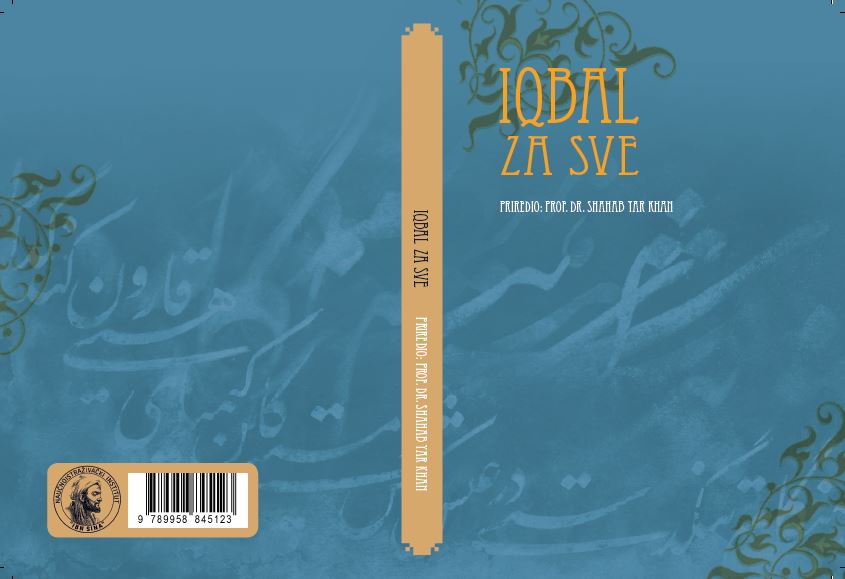
Keywords: Allame Iqbal Lahori;
Allame Iqbal Lahori svakako spada u plejadu velikih likova povijesti islama. Nećemo pogriješiti ako kažemo da još nisu dovoljno istražene i spoznate sve dimenzije njegova sadržajnog života i osebujnog djela. Bio je i pjesnik i filozof, i mistik i intelektualac; poticatelj i njegovatelj ideja, slobodouman mislilac širokih pogleda, ali i politički vizionar i istinski borac. Svaka od dimenzija njegova života i svako od polja njegova djela zacijelo zavrjeđuju pažnju i nude inspiraciju, ali usudit ćemo se kazati kako je Iqbal prije svega bio čovjek vjere i duha. Njegova vjera i duhovnost na najlepši način oslikani su u njegovoj poeziji, stihovima koji iz srca izviru, pa stoga lahko do srca dopiru. Iqbalova poezija je i glas zanesene romantičnosti i zov samopouzdanja i hrabrosti. Ona kliče slobodi, nezavisnosti i junaštvu, ali i poziva ljubavi, samospoznaji i vjeri. Ona na najljepši način oslikava istinsku pjesnikovu, moramo kazati muslimansku, brižnost koja boli. Ta nas poezija poziva k zaboravljenim i zapostavljenim ljudskim vrlinama. Ona nije govor radi govora, ni stih radi stiha; ona je poezija sa svrhom. Kako sam Iqbal veli, premda je „po naravi svog vremena dva slova“ izgovorio, on je ustvari „dva mora u dvije posude“ izlio i „opijen“ se žali na stanje „rata“. Ono što Iqbal govori dolazi ustvari „iz jednog drugog svijeta“. On „brušenjem bisera kur’anskog okeana“ i „odgonetanjem tajne Božije boje“ nastoji „muslimanima brižnu tugu podariti“ i probuditi ih.
More...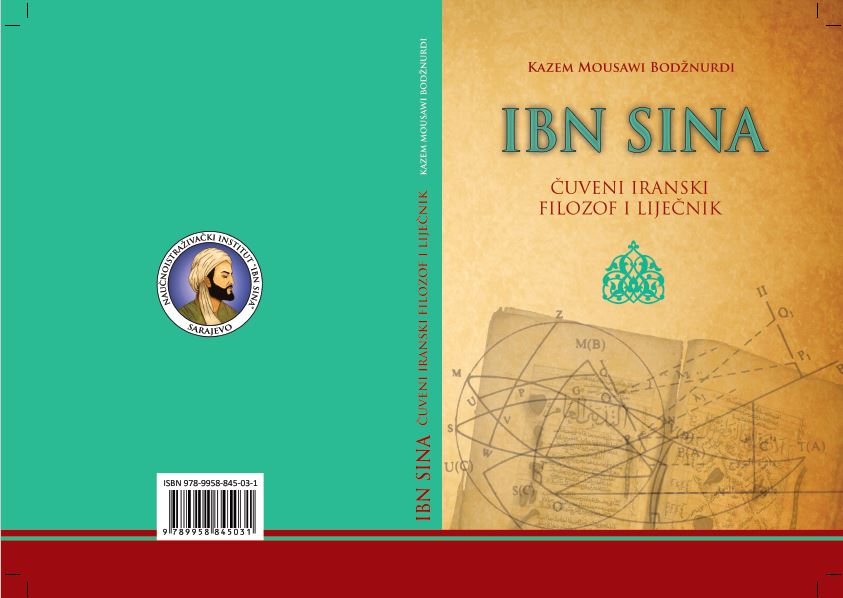
Keywords: Ibn Sina (Avicenna); Islamic philosophy; music theory; linguistics; philosophy of language; epistemology;
Much more information is available about Ibn Sina and his life than about any other Muslim philosopher. This is primarily due to the biography written by his loyal disciple Abu ‘Ubayd Jozjani (died 1046), and the first part of which is actually autobiographical, i.e. it was written by Ibn Sina himself. This writing will later be known as "Sargozasht" or "Sira" (both words, the first in Persian, the second in Arabic denoting a biography or biography). The oldest text of this biography available today is the book "Tatimah siwan al hikmah", the book of Zahiruddin Abu Hasan 'Ali ibn Zayd Beyhaki, which includes some recent information about Ibn Sinau. In addition to this, we have two other accounts of Ibn Sina's life, one in the book Uyun al Inba by Abu Usaybi, and the other in Ibn Qafti's history Tarikh al hikmah. However, the data we find in these two sources differ from each other, although both authors refer to Jozgani's tradition. In addition, Ibn Khalqan in his "Wafiyat al Aajan" brings certain information, which he seems to have taken from Beyheki, and which we do not find in Abu Usaybi and Ibn Qafti. Many years ago, Ahmed Fuad Ahvani found a text of Ibn Sina's biography on the margins of a manuscript copy of Shahrazuri's work "Nuzhetu-l-Arvah". According to Ahvani, these margins were written by Ahmed Kashi in 1353. In 1952, on the occasion of the thousandth anniversary of Ibn Sinai's birth in Cairo, Ahvani published a work entitled "Nukatun fi ahvali Sheikh al Reis Ibn Sina" (Sketches from the Life of the Great Teacher Ibn Sinai), as part of the collection "Zikr Ibn Sinaa". William E. Gohlman published a critical edition of this manuscript in 1974, based on several versions of it, with an English translation, entitled »The life of Ibn Sina«.
More...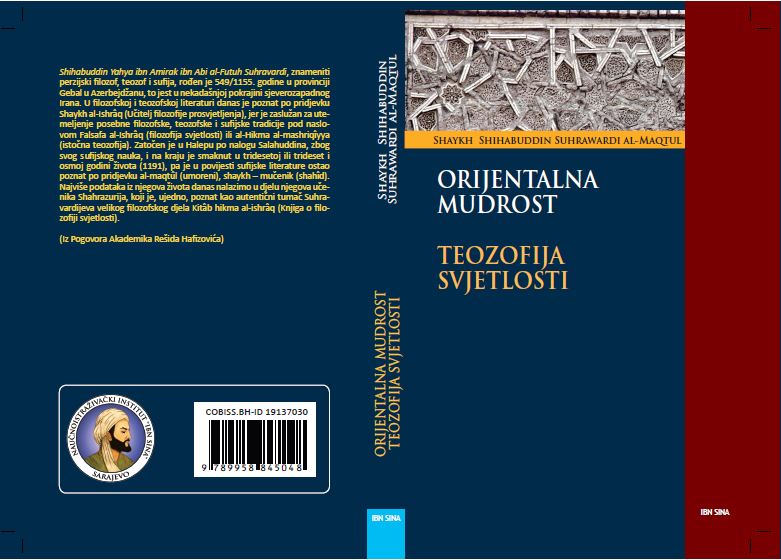
Keywords: Suhrawardī; Persian philosophy; Sufism; Shaykh al-Ishrāq; lluminationist philosophy; Ishraqi school of Sufism;
Shihāb ad-Dīn Yahyā ibn Amirak ibn Abī al-Futuh Suhrawardī, renowned Persian philosophy, theosopher and Sufi, was born in 549 AH (1155 CE) in the province of al-Jabal in Azerbaijan, formerly a province in north-western Iran. He is now known in philosophical and theosophical works as Shaykh al-Ishrāq (master of Illuminationist philosophy), in recognition of his founding a distinct philosophical, theosophical and Sufi tradition known as Falsafa al-Ishrāq (illuminationist philosophy) or al-hikma al-mashriqīyya (oriental theosophy). He was imprisoned in Aleppo on the orders of Salah ad-Dīn (Saladin), on account of his Sufi teachings, and finally put to death at the age of thirty or thirty-eight (1191). He is thus also known in Sufi writings as Shaykh al-Maqtūl (the murdered master) or the martyred shaykh (shahīd). The most comprehensive information about his life is now to be found in a work by his pupil Shahrazūrī, also known as an authentic commentator on Suhrawardī’s great work of philosophy entitled Kitāb hikma al-ishrāq (the Book of Illuminationist Wisdom).
More...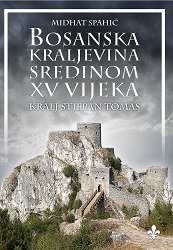
Keywords: Bosnian King Stephen Thomas; Medieval Bosnia; Ottomans; Stephen Vukcic Kosaca; Bosnian Church; Catholicism; 15th century;
Bosnian King Stephen Thomas ruled for almost eighteen years, from 1443 until 1461. While his predecessors had been replaced by Bosnian noblemen, Thomas remained on the throne until the end of his life. The period of his reign was very turbulent, especially the beginning and the end of the reign, and it was marked by conflicts with Ottomans, Stephen Vukcic Kosaca and Serbian Despotate. The way of the succession of the throne in Medieval Bosnia has not been completely revealed. The preserved sources lead to the conclusion that there was no principle of throne inheriting in the Medieval Bosnia. Therefore, with great certainty we can assume that the dignity of being a ruler was a matter of election. The act of election and coronation was under the competence of Medieval Bosnia parliament. The leading Bosnian noblemen had the decisive role in the election of a ruler. The case of Thomas’ coronation was particularly interesting, bringing us the new details on that act, because besides the old Bosnian crown he wanted to be crowned with the new on by the Pope. Namely, the word is about the new crown the Pope Eugen IV prepared for King Thomas as a gratitude for conversion into Catholicism. However, King Thomas was opposed by Bosnian noblemen who had still been devoted to Bosnian Church. The noblemen stopped Thomas to be crowned with the new crown sent by the Pope, because that crown represented the symbol of religious and political reform that was to be implemented in Bosnia. Thomas was aware of the fact that the crowning with the new crown could put the peace in the country and his position of the ruler in danger, so he was forced to abandon such coronation.
More...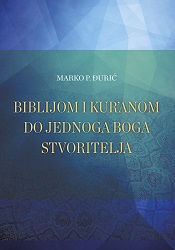
Keywords: Bible; Qur'an; God Creator; atheism; inter-religious dialogue; plurality;
This book is based on the pursuit of true interreligious dialogue. At a time when radical and extreme ideas tend to tensions and conflicts between religions and different religious denominations, but also schools of thought in general, it is extremely important to emphasize the need for unity and harmony among people, especially the heirs of religious traditions. God Almighty teaches us that in relation to others we always keep in mind the value and dignity of man as such, without abandoning the principles of humanity as love of man and justice. This simple message of all messengers of the Word of God throughout history, to our great regret, has been the subject of forgery by their opponents, but also by the alleged promoters of the faith. To try to remove the veils of stupidity, negligence and ignorance, and to turn to the true effort to understand man, and then to understand what God has told him. Respect for man, nature and the divine laws that govern it, will allow us to get to know each other better and be more friends, to give up mutual tension and conflict. In this we can be helped by relying on a common religious tradition, that of Abraham / Ibrahim. Judaism, Christianity, and Islam are the three arms of a sacred religious tradition based on the belief in One God, the Eternal, the Almighty, the Omniscient, the Creator of the World, the Righteous, the Good, the Omnipresent, the Holy Being. God in our common tradition transcends space and time, and forever remains incomprehensible to His creatures. And, again, he is equally the Director and Manager of the World.
More...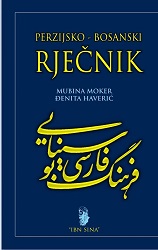
Keywords: Persian-Bosnian Dictionary; Persian language; Bosnian language;
Savremeni perzijski jezik i njemu srodni iranski jezici i dijalekti potječu od zajedničkog indo-iranskog jezika. Oni zajedno sa evropskim jezicima čine širu jezičku porodicu indoevropskih jezika u koje spadaju i grčki, romanski, germanski, slavenski, baltički, keltski, albanski i jermenski jezici. Otuda što pripadaju istoj skupini indoevropskih jezika, perzijski i bosanski jezik su genetski slični, s tim što perzijski pripada iranskoj a bosanski slavenskoj porodici jezika.
More...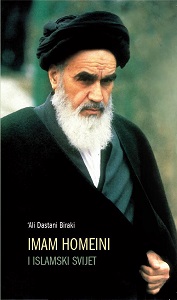
Keywords: Ruhollah Khomeini;
In the vision of Imam Khomeini, r. a., Islam is a world religion that spreads the shadow of its grace over all parts and regions of the world. The Imam’s ideas and words, inspired by the Qur’an, hadith, and sublime Islamic teachings, are life-giving teachings whose primary task is to meet the needs of society, solve social problems, and ensure worldly and otherworldly happiness for peoples. With his broad insight, Imam Khomeini considers the problems of all Islamic societies a common and unique pain, for the elimination of which we must act jointly and comprehensively. He is convinced that the backwardness of Islamic countries in economic, technological, social and cultural terms stems from the old concept of imperialism and colonialism, and cannot be overcome except by a divine movement aimed at awakening and raising awareness of all Muslims, Shiites or Sunnis. (text by the editors)
More...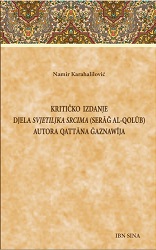
Keywords: The Hearts’ Lantern; Persian literary tradition; Serāğ al-qolūb;
The Hearts’ Lantern is one of the oldest and most important didactic prose works dealing with matters of religion and ethics written in the Persian tongue.In Persia itself, but also outside it (mostly on the Indian subcontinent, in Turkey and in the Balkans, and especially in Bosnia-Herzegovina), for centuries it was known and circlated via manuscripts. After the invention of the printing-press, it was at various times published in Iran and Afghanistan. However, none of those editions fulfil even the basic and necessary conditions for presenting a text to a scholarly audience, nor even to an ordinary cultured reader; namely, none of those printed editions made use of the most relevant primary manuscript sources. Even if we bear in mind that the fate of the autograph is still unclear, the repeated lack of proper philological preparation for publication was a serious methodological flaw which meant that The Hearts’ Lantern was mostly published in versions which for the most part do not correspond to its original form.This lack of scholarly editions, as well as the fact that the identity of the author is unknown, contributed to a marginalisation of this work, as it came to be classed as a popular work, and even as a common pamphlet, meant for a wide, and popular, readership. Such unfavourable development was helped along by several centuries-worth of ideological manipulations of the text wreaked by irresponsible scribes. Irresponsible or badly educated scribes were also responsible for two further misfortunes that plagued this work: probably convinced of the infallibility of their own linguistic ear and literary and aesthetic sense, whilst copying they would allow themselves to make changes and interventions in the text, shortening it or lengthening as they saw fit; and, secondly, incompetent scribes who were not well versed in the classical Persian, altered the classical prose style of the text to make it closer to the Persian language of their own time, which meant that the prose of The Hearts’ Lantern, over the long stretch of time in which it was circulated through manuscripts, lost many of its original linguistic and stylistic features, and with them its quality and value.In such circumstances, the value and the significance of this work was known only to specialist researchers, and this only based on the most relevant manuscript sources. Thus the preparation of the variorum edition presented itself as the main stepping stone towards the proper reception of the work, as well as its critical reassessment within both the Persian literary tradition and the wider Oriental andIslamic literary and cultural context.
More...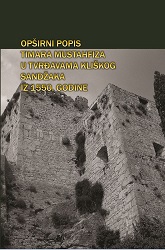
Keywords: Klis Sanjak’s Fortresses; Klis Sanjak; Cretan War; timar mustahfiz;
Kliška tvrđava nalazi se u mjestu Klis, u okolici Splita. Klis su svojedobno naseljavali Iliri, a vremenom će Kliška tvrđava postati jednom od najznačajnijih utvrda hrvatskih krajeva. Ovladavanje Kliškom tvrđavom, zbog njezina iznimnog strateškog značaja, uvijek je predstavljalo izazov za različite osvajače. Izuzetak nisu bile ni snage Osmanske imperije koje su 1537. godine osvojile tvrđavu, a Klis učinile sjedištem Kliškog sandžaka. Grad Klis i Kliška tvrđava ostat će u rukama osmanskih Turaka do 1648. godine, kada u toku Kandijskog rata, grad zaposjedaju Mlečani. Kliški sandžak, jedna od upravnih jedinica Bosanskog ejaleta, osnovan 1537. godine, zauzimao je dosta značajnu površinu. Većim dijelom se nalazio na teritoriji zapadne Bosne, dostižući jednim svojim krakom gotovo centar Bosne. Dalje prema zapadu zauzimao je prostrane teritorije u Dalmaciji, izlazeći na više lokacija i na samu morsku obalu. Naziv je dobio po nepristupačnoj utvrdi Klis, koja se nalazi u zaleđu Splita, na izrazitom uzvišenju iznad bogatog Solinskog polja. Držanje ove tvrđave u svojoj vlasti pokazivalo je stratešku premoć strane u čijim je rukama i omogućavalo joj je kontrolu širokog područja puteva od srednjeg Jadrana ka unutrašnjosti Osmanskog carstva. Stoga je, kao simbol osmanske vojne nadmoćnosti, Klis bio proglašen zvaničnim sjedištem novoosnovanog sandžaka.Knjiga koja je pred vama prevod je i obrada zvaničnog osmanskog deftera – opširnog popisa mustahfiza Kliškog sandžaka iz 1550. godine na osnovu osmanskog izvornika pohranjenog u Arhivu Predsjedništva vlade u Istanbulu, a čija kopija se nalazi u zbirci Orijentalnog instituta u Sarajevu. Osim podataka o mustahfizima i njihovim timarima, defter sadrži i korisne informacije o stanovništvu koje je naseljavalo te timare, a koji su se nalazili u brojnim gradovima, selima i naseljima diljem Kliškog sandžaka. Zahvaljujući tome, on predstavlja i izvor značajnih podataka za proučavanje razvoja pojedinih naselja, kao i funkcioniranja izvršne i sudske vlasti na tim područjima. Nadajući se kako će objavljivanje ovog djela biti od koristi za ovdašnju akademsku zajednicu i omogućiti bolji uvid u neke historijske činjenice iz predmetnog perioda, iskazujemo svoju zahvalnost prije svega autorici, dr. Fazileti Hafizović, ali i Orijentalnom institutu – njezinoj matičnoj kući, kao i rukovodstvu instituta na čelu sa uvaženom dr. Behijom Zlatar koja se saglasila s objavljivanjem ovoga djela u izdanju Naučnoistraživačkog instituta „Ibn Sina“. Temeljni naum i cilj našega Instituta jest doprinositi kulturnom i znanstveno-intelektualnom boljitku društva i zemlje u kojoj djelujemo. Bit će nam drago ako nam ovaj čin bude „upisan“ u djela kojima služimo bh. kulturnoj i akademskoj javnosti pomažući znanstvenim istraživačima, ali i svim znatiželjnicima koji uvidom u kulturnu i političku prošlost i povijest ovih prostora nastoje bolje i sadržajnije razumijeti i obogatiti svoju sadašnjost.
More...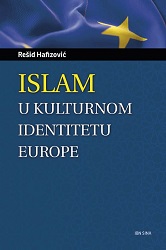
Keywords: Islam; Orient; Orientalism; Andalusia; Islam in Europe; cultural identity; Islamic philosophy;
U sveukupnoj povijesti muslimanskog mišljenja klasična perzijska poezija je bila ta koja je već od ranijih vremena položila temelje onoj duhovnoj pojavi u mislećoj tradiciji islama danas znanoj kao ‘religija ljubavi’(dīn al-’ishq, madhab al-’ishq). Motrena u svjetlu duhovnih činjenica uzetih iz sveobuhvatnog sadržaja primarnih vrela islama Kur’āna i Hadīsa, ‘religija ljubavi’se jednostavno nadaje kao istinska vjera u pogledu Božijem od predvječnosti do postvječnosti, posebice ukazivanjima o činu Božijeg stvaranja svijeta i krunskog Božijeg stvorenja u njemu – čovjeka. Bez nje kao takvegotovo da uopće nije moguće podizati ono što se nazivakulturnim identitetom jedne društvene zajednice. Kakogod je Ljubav prevladavala u Božijem tvoračkom razvijanju‘stranica’ Prirode kao ‘prve objave’ Božije, skupa sa božanskim atributima Znanja i Milosti, ona je većma dominirala i u Božijem oblikovanju njegova krunskog stvorenja, čovjeka, koga je Bog oblikovao u dvije egzistencijalne inačice (Sād, 75), dotaknuvši ga sa ‘svoje Dvije Ruke’, smjestivši njegovo srce ‘među dva prsta Milostivoga’,1 to jeste između božanske Ljubavi i Znanja, i učinivši ga jednom od krajnjih svrha vlastitog stvaranja,baš onih svrha u čijim ljudskim cjeloživotnim plodovima trebaju biti sukusirani najbolji učinci božanske Ljubavi i Znanja.
More...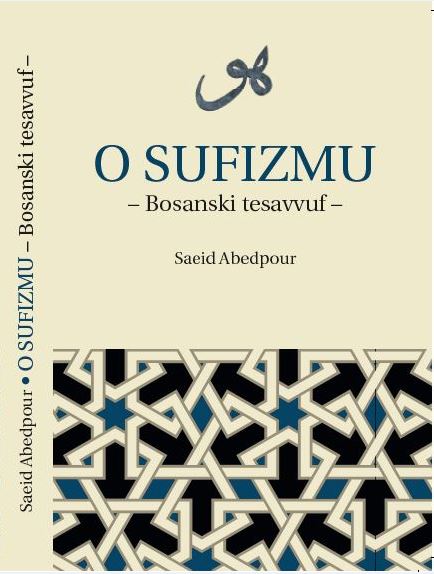
Keywords: Sufism; Taṣawwuf; Bosnia and Herzegovina;
Bosanski tesavvuf kao i ostale teme obrađene u knjizi analizirane su kroz filozofski svjetonazor. Suštinsko pitanje kojeg tretiramo u prvom dijelu knjige jeste u čemu je suština i srž tesavvufa u Bosni i Hercegovini. Tesavvufu Bosni i Hercegovini, uprkos zajedničkom korijenu i povezanosti s tesavvufom islamskog svijeta ipak ima svoje osobene specifičnosti. Stoga smo nastojali da uopćenom analizom pojma “tesavvuf’’ utvrdimo poziciju ovog fenomena u Bosni i Hercegovini, kao i da pružimo sažeto objašnjenje njegovog odnosa sa poviješću i intelektualno-kulturnim naslijeđem, te shodno promotrimo njegovu sadašnju poziciju. Osvrt na život i misao tri bosanska sufijska velikana predstavlja uzvišeni primjer fenomena bosanskog tesavvufa. Ovaj dio knjige nastao je na temelju dugogodišnjih bliskih susreta i razgovora autora sa hadži hafizom Halidom Hadžimulićem, šejhom Zakirom Bektićem i Senadom Mićijevićem. Isti dio završava se kratkom poviješću mesnevihanstva i njegovog značaja za Bosnu i Hercegovinu. Cilj nam je bio da koliko god je to bilo moguće iscrtamo idejnu liniju tesavvufa i njegovih idejnih predstavnika premda je o tome već govoreno. Drugi dio knjige sadrži tri rada u kojima se analizira svjetonazor tri sufijska autoriteta islamskog svijeta. U prvom radu kroz analizu pojma ‘rind’ nastojimo se približiti svjetonazoru velikog pjesnika i sufije Hafiza Širazija. Drugi rad posvećen je Mensuru Halladžu. Halladževe riječi motrene su kroz predaje drugih – prije svih Attara Nišaburija – o njemu. Treći rad tretira ličnost imama Muhammeda Gazalija, kojeg su konstantno optuživali za neprijateljstvo spram filozofije. U radu se iznosi hipoteza da je Gazali kritikom filozofije i svojom religijskom misli bio filozof u punom smislu riječi, te da njegova filozofija odlikovala posebnošću. On se treba motriti kao filozof koji promišlja o pojmu religije i napose tesavvufa. Treći dio knjige sadrži radove u kojima se kroz analizu različitih tema tretira misao Mevlana Dželaluddina Rumija, od kojih su neke ‘Čovjek sa stanovišta Dželaluddina Rumija’, ‘Zbilja smrti’, ’Etika i kriza ekologije’, ‘Šemsi Mevlana’, te radovi koji tretiraju razne teme, kao ‘Šutnja’, ‘Žena u sufijskoj literaturi’, ‘Vjerovanje i razum’, ‘Paradoks tradicionalizma’, ‘Hadže Abdullah Ensari’. Premda se radovi tematski razlikuju, njihova nit-poveznica je kritičko-filozofsko zadiranje u temu.
More...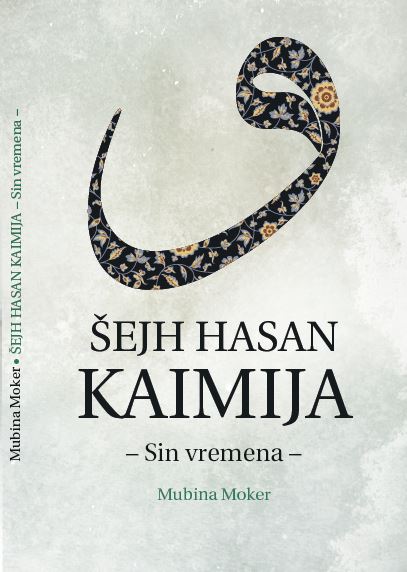
Keywords: Shayh Hasan Kaimi;
Šejh Hasan Kaimija poznat kao Kaimi Baba jedan je od istaknutih bosanskih šejhova XVII st., koji je iza sebe ostavio hvalevrijedan poetski opus. Bio je osoba koja je duhovnošću obilježila svoje vrijeme. Premda vezan za tekiju Kaimija je bio dobro upoznat sa političkim prilikama i stanjem običnog čovjeka. Njegova duhovnost nije bila duhovnost odvojena od problema čovjeka i kao jedan učenjak-intelektualac smatrao je svojom dužnošću baviti se i ekonomsko-političkim pitanjima. Kaimi Babino protjerivanje iz Sarajeva u Zvornik nakon što je protestvovao pred vlastima zbog enormnog poskupljenja hljeba veoma zorno pokazuje njegovu društvenu angažiranost kao kaderijskoga šejha i pročelnika Hadži-Sinanove tekije.
More...